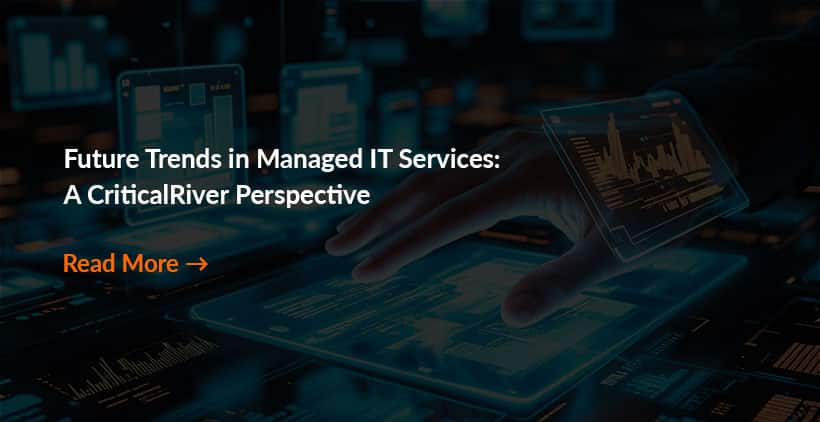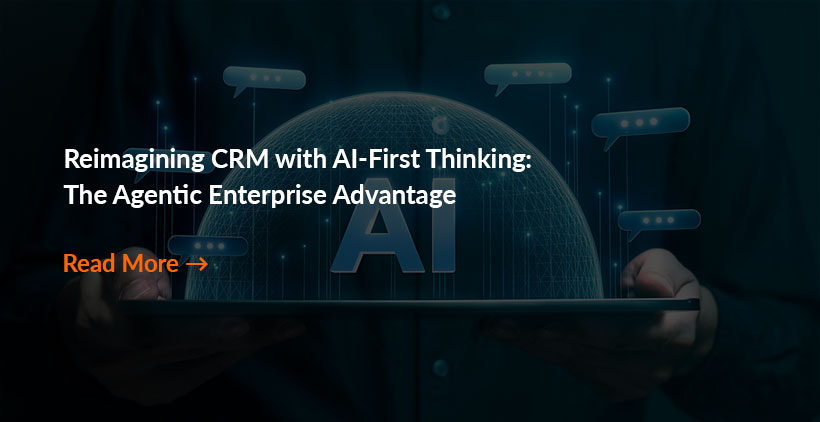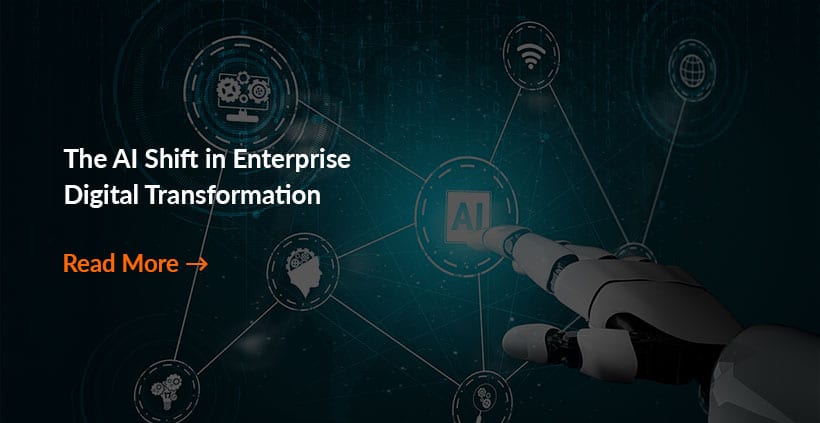
As organizations realize the value cloud platforms, data analytics, and automation provide for business success, they adopt professional IT services to harness the underlying benefits effectively. Experienced managed service providers (MSPs) help enterprises focus on their core business functions while minimizing the effort to keep up with technology disruptions.
Offering customized solutions across industries, CriticalRiver enables organizations to ride the wave of digital transformation and deliver tangible business outcomes. And with a constant fervor for technology evolution, we align our clients’ work practices to the trends that lead to new growth avenues, sharpen risk management, and build better customer experiences. According to our research, here are some key trends that organizations should be aware of to capitalize upon digital technologies and be at the leading edge of their industry’s growth:

Cloud migration services
Migrating to the cloud is non-negotiable for digital transformation. However, in this relocation, enterprises should not merely aim to be on the “cloud,” but to embrace a state of continuous reinvention. While moving an application to the cloud may seem simple, businesses should not overlook that the application’s function is linked to multiple processes involving different departments, vendors, and regulatory compliance. That’s where the expertise of MSPs will now play a more discerning role.
The approach to cloud migration will need to ensure that applications are inventoried, relationships are mapped, and technical requirements are scoped. MSPs will also assess emerging risks and plan milestones for every application’s pathway to a cloud platform. And they will need to align all the paths to take the organization’s entire operational ecosystem to the cloud via an orderly and sequenced process.
Whether re-hosting, re-platforming, or re-factoring, MSPs must employ complex logic and data-driven analysis to successfully execute the migration plan for applications and infrastructure.
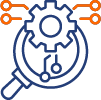
Integrated IT solutions
As businesses increasingly diversify applications and software to handle internal operations, improve communications with stakeholders, and serve customers, they also have to ensure flexibility and seamless integration between an array of setups. The focus will, therefore, be on building interconnected, scalable networks that can smoothly integrate cloud, on-prem, and hybrid environments.
Application programming interfaces (APIs) are key in synchronizing data and workflows across multiple tools. MSPs are likely to use techniques such as pagination, async loading, caching, payload compression, and connection pooling to augment the performance of APIs for their clients while also strengthening cybersecurity across the integrated systems. They will also focus on real-time monitoring and predictive analytics for a proactive approach to system upgrades. They will keep integrated systems attuned to business objectives and ensure they adapt to shifting market demands.
Additionally, future-ready organizations can leverage MSPs’ expertise in low-code platforms to speed up their system integrations and reduce technical debt.
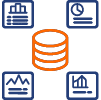
Data management and support
Data management practices have evolved over the years. Initially, they revolved around strategies to maintain regulatory compliance and counter cyber threats. A key trend in the data management and support services offered by MSPs will be their emphasis on implementing data governance frameworks for organizations. These would help establish clear data usage policies, ensuring platform consistency, privacy, and security. Cloud data management services will continue to make access to data easier for businesses while giving them control over storage, security, and privacy. The importance of data fabric will grow for seamless connection of on-prem and cloud data sources.
Data lineage is another domain where MSPs support enterprises by making tracking and visualizing data flow from its origin to its destination simpler. Besides fortifying trust in information pools, data lineage makes data dependencies more transparent, improves data quality, and supports compliance to meet auditing requirements.

Reporting tools
Businesses hire managed IT services to customize their reporting and dashboard structures to get actionable insights. By incorporating the latest tech trends, such as automation, AI, and data visualization, service providers make these reports informative and predictive to guide organizations in mission-critical decisions.
Trends suggest increased integration of different data sources through APIs and cloud platforms for secure data flow and visually rich dashboards tailored to the needs of different organizational departments and leaders. Machine learning will be incorporated to enhance reporting tools for quick anomaly detection, forecasting, risk management, and trend analysis, allowing organizations to stay ready for market changes and regulatory compliance.
MSPs will need to consistently work around the scalability and adaptability of these dashboards, keeping them responsive to the changing reporting needs of a business as it grows. They will also prioritize data governance, information security, and compliance with industry standards to maintain the integrity of business reports for strategic decision-making.

AI-driven automation
AI proactively identifies and addresses issues that could otherwise affect routine workflows through machine learning, predictive analytics, and manual error reduction. By leveraging managed AI automation systems, MSPs expedite the response speed, boost uptime, and reduce operations costs for their client organizations.
In the manufacturing industry, predictive maintenance will increasingly become a significant AI use-case with sensors, algorithms, and digital twins to monitor equipment health and predict failures before they trigger downtime. AI-powered robotic process automation streamlines production processes to optimize output and quality.
Likewise, automated grid and IT asset management and AI-assisted energy demand and distribution prediction will become more common in the utility industry. AI automation will assist in application development, bug removal, and testing in the high-tech sector.
Non-profit organizations, too, can capitalize upon AI and automation support offered by managed IT service providers to vitalize their communication campaigns, donor management, and resource allocation. They can implement chatbots to respond to volunteer/donor queries and use AI-based data analysis for optimal fundraising strategies.
Staying Agile for the Future
CriticalRiver has synchronized its managed IT services to the growing complexities of organizations’ use of technology. We understand that every company is at a different stage in its digital transformation journey, and we help them reach new performance levels with tailored solutions.
Market trends today point to a rising need for cloud services, elimination of silos that dilute the efficacy of enterprise assets, using real-time data for reports that drive strategic decisions, deploying zero-trust models for cybersecurity, and making the most of what AI has to offer without undermining the importance of human reviews. Our IT services are ready to meet these requirements while addressing the change management challenges surrounding them.
Ready to future-proof your IT infrastructure? Connect with us at contact@criticalriver.com to explore how we can support your transformation.
